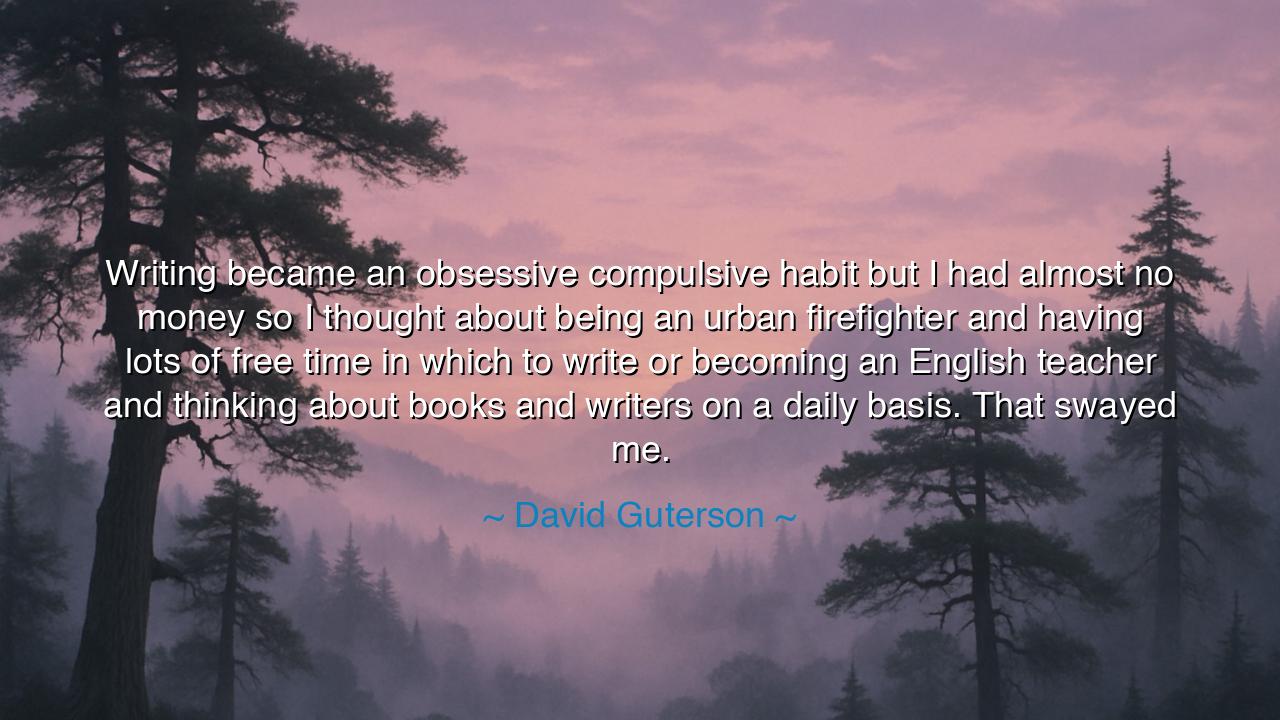
Writing became an obsessive compulsive habit but I had almost no
Writing became an obsessive compulsive habit but I had almost no money so I thought about being an urban firefighter and having lots of free time in which to write or becoming an English teacher and thinking about books and writers on a daily basis. That swayed me.






In the words of David Guterson, the novelist whose pen carved out worlds of quiet depth, we find a confession of both struggle and destiny: “Writing became an obsessive compulsive habit but I had almost no money so I thought about being an urban firefighter and having lots of free time in which to write or becoming an English teacher and thinking about books and writers on a daily basis. That swayed me.” This saying reveals the tension that every artist has known—the pull between survival and vocation, between the practical burdens of life and the burning fire of creation.
To describe writing as an “obsessive compulsive habit” is to admit that the craft was no mere pastime, but a need of the soul, a compulsion as natural as breathing. Yet the path of art is rarely paved with gold. Guterson speaks of having “almost no money,” a reminder that devotion to creativity often requires sacrifice. Here we see the ancient conflict: the world demands labor for bread, while the spirit demands time for expression. Few can hold both with ease, and so the artist is forced to choose a way of life that keeps the flame alive without letting hunger extinguish it.
The choices Guterson weighed—firefighter or teacher—are themselves symbolic. The firefighter faces danger, rescues lives, and then returns to long stretches of waiting; the teacher lives among books, minds, and the young, immersed in words and thought each day. Both roles provide sustenance, both provide time in their own way, yet it was the path of the teacher that “swayed” him. For in that choice lies wisdom: to surround oneself with the very elements that nourish the inner calling. To be among books and ideas is to live in a garden where the seeds of writing can grow.
This tension between practicality and passion echoes throughout history. Consider the life of Franz Kafka, who toiled in an insurance office while secretly crafting stories at night. His daily work gave him stability, but it drained his soul; his true life was in the hours stolen for writing. Contrast this with Anton Chekhov, who chose the life of a physician, not abandoning literature, but weaving his observations of suffering and humanity into his stories. Both men lived in the balance of survival and vocation, and from this balance came enduring works. Guterson’s choice to teach echoes this tradition: to find a life that sustains the body while also feeding the spirit.
The meaning of his words is therefore twofold. First, they show us the perseverance of the artist, who finds a way to create even in the midst of hardship. Second, they reveal the wisdom of shaping one’s environment so that it nourishes one’s calling. To teach English was not only a livelihood, but a daily reminder of books, words, and ideas—an atmosphere that kept his writing alive, even as life pressed upon him.
From this, a lesson unfolds for us all: when torn between passion and necessity, choose a path that supports both if you can. Do not abandon your art, but find a life that surrounds it with nourishment. If you must labor, let it be in a field that feeds your spirit. For to compromise entirely is to kill the calling, but to weave the calling into the fabric of life is to keep the fire burning through all storms.
In practice, this means seeking harmony between work and vocation. If you are an artist, surround yourself with the world of your art—even if your work is elsewhere, find ways to keep the books, the music, the tools of creation near. If you are not an artist, the lesson still applies: build your daily life around what feeds your soul, so that survival does not starve meaning.
Thus, Guterson’s words, though spoken in humility, stand as a beacon: “That swayed me.” He reminds us that every choice we make shapes not only our survival, but the fate of our deepest passions. Let us then choose with wisdom, so that the necessities of life do not bury our callings, but instead sustain them, until they bear fruit for generations to come.






AAdministratorAdministrator
Welcome, honored guests. Please leave a comment, we will respond soon